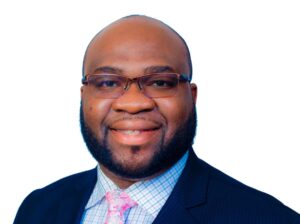Enang Urges Sub-nationals To Embrace Fiscal Prudence For Sustainable Economic Growth

Sequel to a recent Tax Reform Bill which proposed a derivation-based model for Value Added Tax (VAT) distribution, a proposal which has ignited debates on the fiscal autonomy of States, an Adjunct Professor of the North Dakota University, USA, Engr. (Dr.) Wisdom Patrick Enang has urged sub-nationals to embrace fiscal prudence, for sustainable economic growth.
Dr. Enang stated this on Friday, November 22, in an interview with newsmen in Uyo, the Akwa Ibom State capital.
In his opening remarks, the astute scholar stressed that the current reliance on federal allocation was not sustainable if Nigeria’s States are to chart a path forward towards economic resilience.
“The push for fiscal reform in Nigeria and her sub-nationals has reached a critical juncture, occasioning the need for States to address the systemic inefficiencies that have long undermined their growth.”
Contextualizing further, Dr. Enang maintained that Nigeria’s over-reliance on the Federal Account Allocation Committee (FAAC) allocation has created a precarious fiscal architecture which is further highlighted in BudgIT’s 2024 “State of States” report.
“According to BudgIT’s report, 14 States of the federation depend on FAAC allocation for over 70% of their revenue.”
“Federal allocations have long been an economic lifeline for the States, but they also worsen budgetary instability, discourage innovation, and reinforce complacency.”
While enunciating the imperatives required to achieve fiscal resilience at the subnational level, the economic egghead and Fellow of both the Nigerian Society of Engineers (FNSE) and the Nigerian Institution of Safety Engineers (FNISafetyE) drew valuable insights from the LAGOS STATE economic model.
“With FAAC allocation accounting for only 26.55% of its revenue, Lagos State has demonstrated fiscal resilience which is underpinned by a thriving local economy, robust tax base, and private-sector growth.”
This model, he averred, enables critical investments in infrastructure, education, and healthcare, forming a virtuous cycle of economic growth and development.
“The lesson is clear: dependency is a choice, not an inevitability. For many States, transitioning from federal reliance to internally generated revenue (IGR) presents significant challenges, but the rewards are enormous.”
The Akwa Ibom born, British trained Chartered Engineer who is fully registered with, and accredited by the British Engineering Council further added that regions such as Zamfara and Kaduna, with weak industrial bases, face steep hurdles in expanding their tax base.
“Similarly, agrarian States like Benue, despite their vast resources suffer from lack of processing facilities to transform raw produce into high-value goods, due to structural deficits, hence the need for targeted investments in infrastructure, agro-processing and industrial development.”
“Achieving fiscal independence requires the mitigation of several systemic inefficiencies including harnessing the tax-potential within the informal economy which accounts for more than 70% of SME transactions in Nigeria, and addressing weak governance and corruption which undermines revenue collection and fiscal integrity.”
According to the renowned policy strategist, addressing these issues demands bold leadership, effective governance and a long-term commitment to results-oriented economic reforms. He further emphasized that the proposed derivation-based VAT model offers a lifeline for States to recalibrate their revenue systems to achieve a more resilient and competitive economy.
“While the derivation-based VAT approach has drawn criticism from regions that fear losing federal support, it incentivizes productivity and fiscal responsibility, encouraging States to maximize their economic potential,” Dr. Enang opined.
Known for his massive campaigns and sustained advocacy for the adoption of a value-driven approach to leadership and governance, Dr. Wisdom Enang noted that the transition to a derivation-based VAT system was not merely a fiscal necessity but a social and political imperative.
“With over 18.3 million children out of school, and over 133 million Nigerians living in multidimensional poverty, States cannot afford to maintain the status quo. Investment in human capital, alongside reforms in taxation and governance is essential to achieve sustainable economic growth.”
Leveraging on lessons learnt review from other developing Nations, the Ethical and Attitudinal Reorientation Czar revealed that Nigeria was not alone in grappling with fiscal centralization, as countries like Brazil and India, previously faced with similar challenges, are now classical examples of how sub-national governments can thrive with the right mix of fiscal decentralization and accountability.
“For example, Brazil’s Sao Paulo State has leveraged its industrial base to build a diversified economy, while India’s Kerala State has made significant strides in human capital development by prioritizing education and healthcare.”
These examples, according to Dr. Enang, offers valuable lessons for Nigeria’s States, even as he noted that the reported success hinges on strategic planning, effective resource management, and inclusive policies that prioritize long-term development over short-term gains.
He therefore craved the indulgence of Nigerian State governors to see the clamor for fiscal reforms not as a threat, but as an imperative towards achieving fiscal independence, even as he noted that reducing the reliance on FAAC allocation required painful but necessary adjustments such as: ensuring an efficient and equitable tax system to broaden the tax base and increase revenue collection; curbing revenue wastage and leakages; ensuring fiscal discipline and integrity; and creating a competitive fiscal environment for investments to thrive.
“Similarly, strengthening financial management systems to ensure transparency, accountability, and prudent resource allocation is also crucial.”
In his final analysis, the Chairman Board of Trustees of the BBC-praised and philanthropic “Sarah Enang Humanitarian Foundation” submitted that investing in critical infrastructure such as roads, electricity and export facilities was imperative towards achieving sustainable economic growth and job creation in Nigeria.
He further added that prioritizing education and skills training to build a skilled workforce and enhance human capital was equally important.
“By taking these steps, Nigeria’s States can unlock their full potential and build a prosperous future for their citizens, and the time for action is now!”
